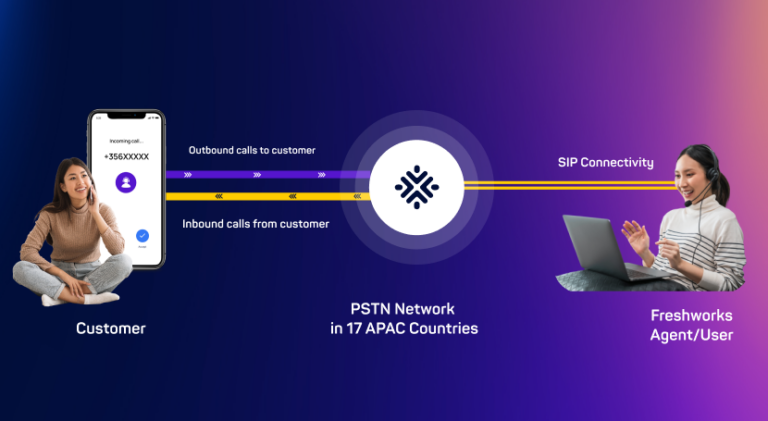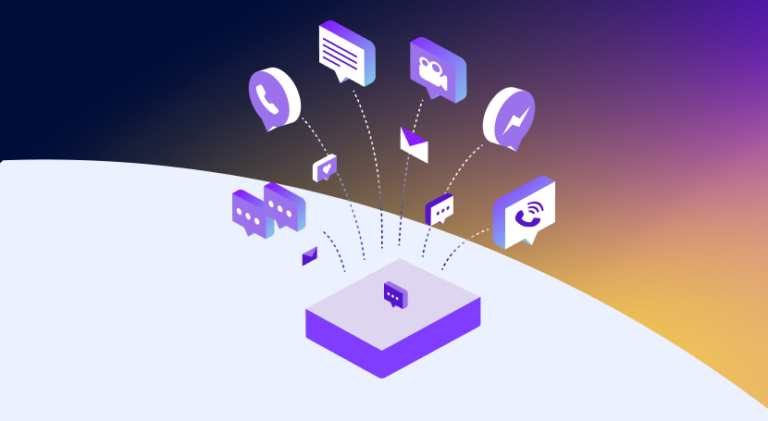With this new Bring Your Own Carrier (BYOC) solution, you can now choose your carrier directly within the Freshdesk Contact Center platform.
It takes months to find a customer, but mere seconds to lose one.
According to research by Bain & Company, increasing customer retention rates by 5% would increase a company’s profits by 25% to 95%. In addition, it costs about five times more to attract new customers than to retain an existing one.
It goes without saying then, that a customer retention strategy is important for a company to improve its bottom-line.
When PwC asked 15,000 customers about their experience, they found that 1 in 3 people are ready to leave a company with just one bad experience. And, if they experience 2-3 negative communications, 92% of them will completely abandon the company.
Revenue is not the most important KPI anymore. Customer experience is the name of the game.
And, in all honesty, it makes sense.
Revenue doesn’t guarantee a loyal customer base or constant retention. But, a great experience ensures that a customer stays with you, and contact centres are a key element for a great customer experience.
Why are contact centres important for customer experience?
Most people would prefer to self-help if they can, and only reach out to speak to someone if there’s no easier way. This means that only complex or critical issues tend to end up at contact centres.
How a customer is handled at this point would have a great impact on not just customer satisfaction, but brand perception as well. (Woe to those who underestimate the power of social media!)
That’s why contact centres have to develop along with changing customer expectations.
Why are more companies moving their contact centres to the cloud?
As customers become increasingly reliant on digital channels, it becomes very difficult for legacy or on-premise solutions to meet their needs.
A cloud contact centre makes it easy for companies to stay connected with their customers no matter where they are or which channel they are on. Agents are no longer confined to a physical office and can serve customers remotely and on any device.
In addition, operating your contact centre in the cloud brings about a host of benefits such as easy and powerful integrations, higher data security and lower costs. We’ll cover more of that later on.
But how can you set up a contact centre in the cloud?
Enter CCaaS (Contact Centre as a Service).
What is CCaaS?
A CCaaS is a cloud-based platform that improves customer experience by allowing businesses to adopt a contact centre provider’s software.
The beauty of it is that you can easily purchase the services you need, reducing the burden on your internal IT support team.
Why should I consider CCaaS for my business?
Here’s what’s great about it!
1. Simple integrations leading to a unified contact centre
A major problem with on-premise contact centres is the need for an application to connect it to the cloud. This makes it a rigid process and very difficult to get connected to other systems.

Get monthly nuggets of wisdom for all things customer experience in your inbox
This is not the case with cloud-based contact centres as they are simple to integrate with your company CRM, messaging service, phone, web service or any other system.
Here’s a primer on connecting your cloud phone system to a CRM.
2. Flexible model, transparent price & user-friendly
The CCaaS model is scalable and dynamic as you can easily accommodate as many agents you want.
There are seasons when we see sudden spikes in enquiries and it becomes difficult to handle all the customers. CCaaS becomes a major advantage for such a situation as it can adjust flexibly and responsively according to your requirements.
3. Reduced costs help you invest more in other resources
While legacy and on-premise solutions are very costly due to maintenance and management costs, the CCaaS model is simpler.
You can just subscribe for the services you want without investing in the infrastructure. The pay-per-use model makes it even more flexible for companies to pay as per their requirement. Even though migrating to the cloud is expensive in the beginning, it pays off in the long run.
4. Higher productivity and efficiency through automation
CCaaS enables you to integrate tools and create powerful workflows that help to automate processes, allowing your agents to focus on efficiently resolving customer enquiries, like Gojek did.
CCaaS solutions also sometimes make it possible to respond to customers faster with AI-powered virtual knowledge assistants listening in on the conversation and suggesting responses and knowledge articles.
Have a look at the 7 ways your contact centre can benefit from Interactive Voice Response as an example.
5. Serve your customers from any part of the world
Today, work goes on regardless of your physical presence in the office.
Similarly, agents are no longer expected to be physically present at a centralised location in order to communicate with the customers.
Cloud makes it very easy for an agent to communicate with the customers remotely. The setup is simple and flexible. Here are a few tips for your team to improve the customer experience while working remotely.
6. Ensuring data security builds trust
Securing your customers’ data is extremely important and any breach of information would have heavy consequences.
With the right security and risk measures in place, the cloud can be a very safe place to store your data.
7. Easy updates for the system
Unlike a hardware system that requires a lot of time & coordination, cloud-based solutions can be updated easily.
They are usually deployed and managed by your CCaaS provider, which reduces the burden on your IT teams. It takes a few hours and can be done from anywhere.
If you are planning to move your legacy, on-premise contact centre to the cloud, there’s no better time to do it. In the coming years, there is going to be a significant boom in cloud contact centre adaptability, and your customers won’t be waiting patiently for you to catch up!
 Nora Huin
Nora Huin 

 Beatriz Ruiperez
Beatriz Ruiperez 
